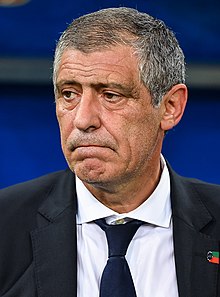
Futebol Clube do Porto, MHIH, OM, commonly known as FC Porto or simply Porto, is a Portuguese professional sports club based in Porto. It is best known for the professional football team playing in the Primeira Liga, the top flight of Portuguese football. Founded on 28 September 1893, Porto is one of the "Big Three" teams in Portugal – together with Lisbon-based rivals Benfica and Sporting CP, that have appeared in every season of the Primeira Liga since its establishment in 1934. They are nicknamed Dragões (Dragons), for the mythical creature atop the club's crest, and Azuis e brancos (Blue-and-whites), for the shirt colours. The club supporters are called Portistas. Since 2003, Porto have played their home matches at the Estádio do Dragão, which replaced the previous 51-year-old ground, the Estádio das Antas.
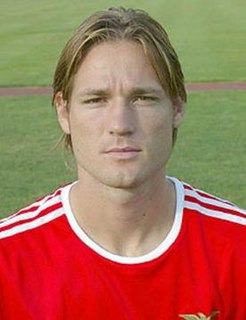
Miklós "Miki" Fehér was a Hungarian professional footballer who played as a striker.

Sport Lisboa e Benfica, commonly known as Benfica, is a professional football club based in Lisbon, Portugal, that competes in the Primeira Liga, the top flight of Portuguese football.
Joaquim Manuel Sampaio da SilvaOIH, known as Quim, is a Portuguese former footballer who played as a goalkeeper.

Kostas Katsouranis is a Greek former professional footballer. A versatile defensive midfielder, he won the Super League Greek Footballer of the Year Award in 2005 and 2013, as well as the Cosme Damião Award for Footballer of the Year in 2008.
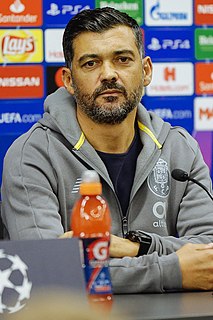
Sérgio Paulo Marceneiro da Conceição is a Portuguese professional football manager and former player who mostly played as a right winger. He is the current manager of Porto.
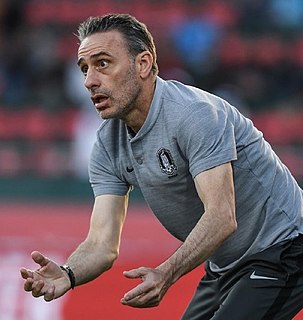
Paulo Jorge Gomes Bento is a Portuguese retired footballer, and the current manager of the South Korea national team.
Augusto Soares Inácio is a Portuguese retired footballer who played as a left back, and a manager.

Abel Fernando Moreira Ferreira, known simply as Abel as a player, is a Portuguese football manager and former player who played as a right-back. He is the current head coach of Brazilian club Palmeiras.

Adelino André Vieira de Freitas, known as Vieirinha, is a Portuguese professional footballer who plays as a winger or a full back for Greek club PAOK.
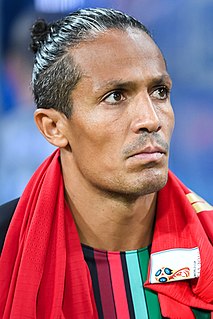
Bruno Eduardo Regufe Alves is a Portuguese professional footballer who last played as a centre back for Italian club Parma Calcio 1913.

Eliseu Pereira dos SantosComM, known simply as Eliseu, is a Portuguese former professional footballer who played either as a left back or left winger.
Sérgio Miguel Relvas de Oliveira is a Portuguese professional footballer who plays for FC Porto and the Portugal national team as a central midfielder.

Danilo Luís Hélio Pereira, known as Danilo Pereira is a Portuguese professional footballer who plays as a defensive midfielder for Ligue 1 club Paris Saint-Germain and the Portugal national team.
The 2006–07 European football season was the 103rd season of Sport Lisboa e Benfica's existence and the club's 73rd consecutive season in the top flight of Portuguese football. The season ran from 1 July 2006 to 30 June 2007; Benfica competed domestically in the Primeira Liga and the Taça de Portugal. The club also participated in the UEFA Champions League as a result of finishing third in the Primeira Liga in the previous season.

Andreas Samaris is a Greek professional footballer who plays as a midfielder for Portuguese club Benfica and the Greece national team.
Ilídio Fernando Torres do Vale, known as Ilídio Vale, is a Portuguese football manager, currently serving as an assistant coach of the Portugal national team.

André Filipe Tavares GomesComM is a Portuguese professional footballer who plays as a central midfielder for Premier League club Everton and the Portugal national team.

José Pedro Malheiro de Sá is a Portuguese professional footballer who plays as a goalkeeper for Greek club Olympiacos.
